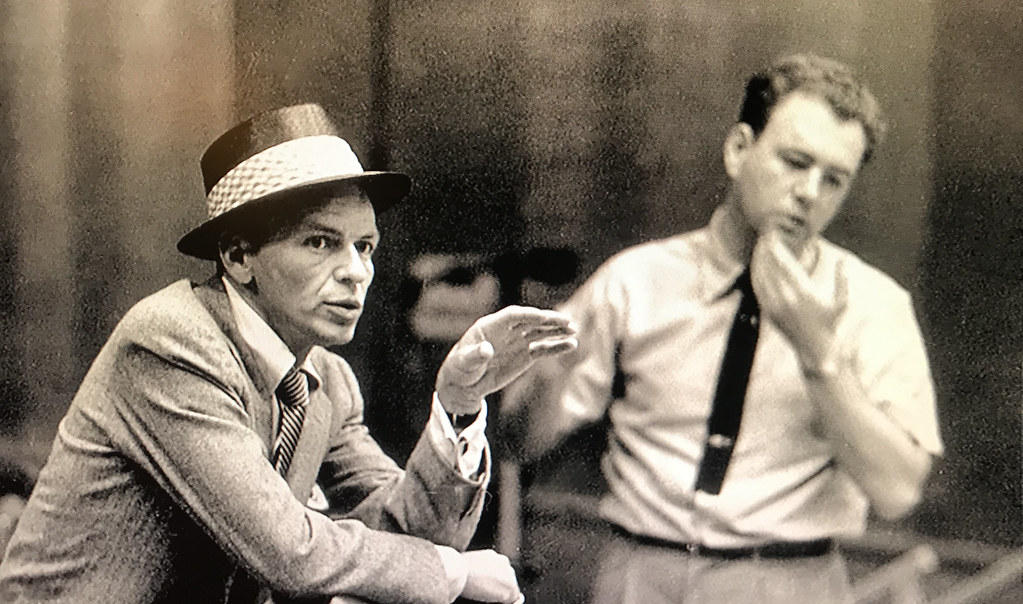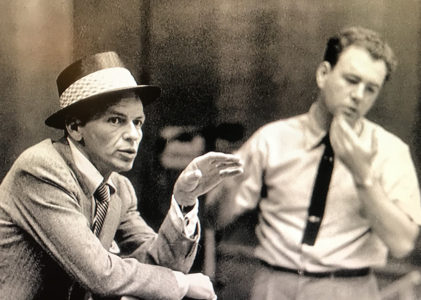Another exclusive behind-the-music story from the staff and management of Angels Grace Hospice (and part one of our two-part tribute to the genius of Frank Sinatra).
Long before he became “Old Blue Eyes” and long before he became famous for his Brat Pack swagger, his Hollywood cool, and his swinging Palm Springs weekends, Frank Sinatra was just a skinny Italian kid from Hoboken with a voice seemingly bestowed upon him by the gods.
For our purposes, however, and in this brief space, it’s best to think of the man’s career in three parts. In the first, Sinatra was the young lead vocalist for two of the most popular big bands of the day, Harry James and Tommy Dorsey, and soon thereafter, a white-hot solo performer whose throng of young screaming female followers were quickly dubbed “bobby soxers” by the national media.
And in the third, he was the aging but still proud icon whose bittersweet canon included such gut-wrenching homages to male memory, retrospection, and regret as It Was a Very Good Year, The September of My Years, and, of course, My Way.
But it’s that second section – the middle part of his career—we’d like to tell you about here. Because that’s the part during which Frank Sinatra truly found his footing and really discovered who he was—as both a man and a singer.
A big part of that, of course, was his voice itself. Sinatra’s voice aged in the 1950s. And in doing so, it deepened. It mellowed. And much like a great wine, it began to develop subtleties, textures and hints of things it had never before exhibited.
But almost as important as the changes in Sinatra’s voice were the changes he went through as a man. He became a father. His longtime marriage to his first love, a nice Italian girl from Hoboken and the mother of his children, ended. And he met, fell in love with, and married a woman about whom he’d ultimately obsess for the rest of his life, actress Ava Gardner.
Sinatra and Gardner were like oil and water as a couple, and the two seemed to want to love, possess and even hurt each other in equal measure. For a time, theirs was a volcanic passion that didn’t just border on the unhealthy. It bathed in it.
What’s more, during this time Sinatra was dying professionally. His career at Columbia Records had more than stalled. No longer seen as a teen idol, the thirty-something Sinatra couldn’t buy a hit. In addition, his old boss, Tommy Dorsey, who’d signed him to an onerous contract years earlier that gave him 43% of all Sinatra’s future earnings, refused to let the singer out of the deal.
He was trapped, in other words, with no way out. Enter the Italian mob – or so goes the legend.
In The Godfather, author Mario Puzo had some Italian mobsters threaten a big Hollywood producer as an inducement for him to cast an Italian singer in his upcoming film, one whose background bore a striking resemblance to Sinatra’s. Sinatra reportedly hated the character and, by extension, its creator. But the simple fact was, not only did Dorsey surprise just about everyone by letting Sinatra out of his contract, but the down-on-his-luck singer was also soon cast in From Here to Eternity, two completely unexpected moves that not only lit a fire under Sinatra’s flagging career but freed him up to sign a new deal with Capitol Records.
And the latter of those two moves turned out to be the big one because it was at Capitol where the Sinatra we now know was truly created. Teaming him with Nelson Riddle, a conductor known for lush, tasteful, and every-so-often deeply emotional arrangements, Capitol was able to tap Sinatra’s special gift for a song by giving him just the right material and framing his voice in just the right way. The net result was a marriage made in musical heaven.
At Capitol, Sinatra seemed to not so much sing a song, as feel it – and do so in a way that almost any Ordinary Joe might. There was something about his aging, mellowing voice, and something about his unique style of phrasing that touched people, especially men, and made middle-aged guys from Maine to California feel somehow connected to him – a connection that led to a run of commercially and critically successful hit albums between 1953 to 1961, each one further securing his place, not only in the pantheon of great torch singers, but in the heart and soul of the generation of middle-aged Americans who’d ten years earlier helped turn back Hitler and keep the world safe for democracy.
And of all the recordings the sadder-but-wiser Sinatra made at Capitol, perhaps the greatest example of his unique way with a song was one little broken-heart ballad, in particular, a ballad Johnny Mercer had written just a few years prior for a Fred Astaire show he was working on at the time. Mercer, a loyal and devoted family man, had met Judy Garland on a set one day and the two quickly began a torrid affair. Yet, almost as soon as the affair began, Garland – one of the most notorious maneaters Hollywood has ever seen – ended it. A devastated Mercer was compelled to write a handful of heartbreak songs in her memory, but one of them was a bluesy little nugget about a guy, a gal, a bar, and a jukebox.
One for My Baby (and One More for the Road) is Sinatra at his absolute finest, Sinatra at the very peak of his powers. It’s a song that allows the singer to reach deep inside and channel all that hurt, and loss, and pain he’d known that decade into a single recording. Riddle’s arrangement of Mercer’s lament not only frames Sinatra’s voice just so, but it puts the listener there in the tavern with him. You can hear, see, and even feel his emptiness; the emptiness of the saloon in which he’s drowning his sorrows; the emptiness in his heart; the emptiness of the life now waiting for him on the other side of the door.
Frank Sinatra had never been as good before One for My Baby, and, for our money, would never be quite so good ever again.
So, with that, Angels Grace invites you to spend a few moments with us, reading some of our testimonials, and learning a bit about who we are and what we do. And while doing so, please take a moment to sample a few moments of an historic era for music; an era during which a World War II teen idol somehow managed to become a post-war icon of middle-aged heart and everyman soul; and an era during which, in one remarkable song – a smoky ballad about a guy drinking to forget – Sinatra became Sinatra.
. . . .
You’ll need a Spotify account to listen to this full playlist otherwise you can skip through the previews below.


